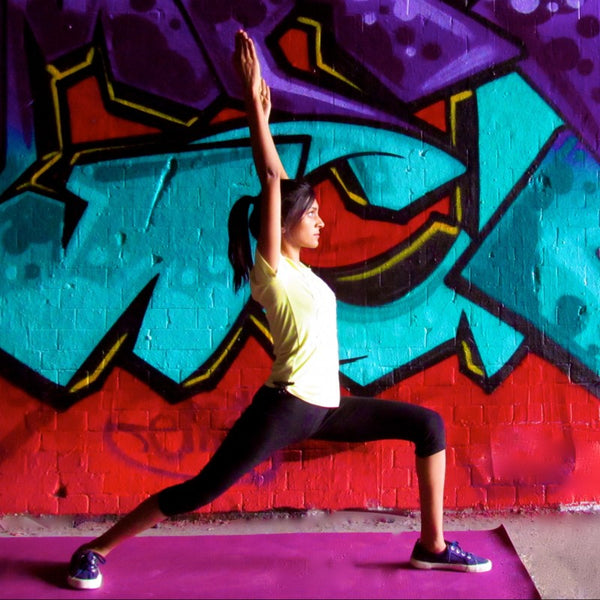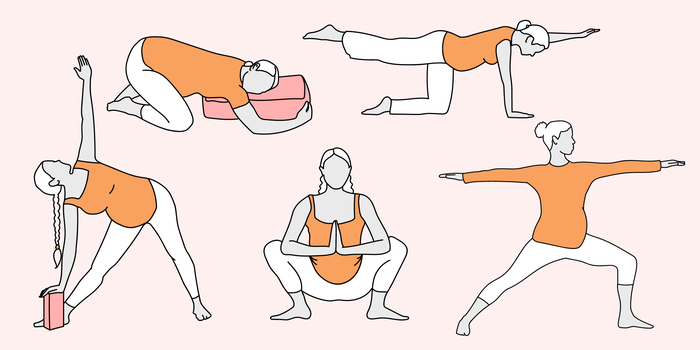
It's no surprise that yoga has become more popular with Black women. Yoga has been traditionally associated with white women. However, an article published in Ebony in 1975 focused on increasing numbers of Black women who are practicing yoga. According to Williford, yoga can help people manage stress and find a sense of community. Because yoga is holistic, it can reduce the chance of developing chronic diseases. These are just a couple of examples of yoga's benefits for Black women.
In a recent interview 20 Black women representing a variety of backgrounds spoke out about their yoga experience and the many benefits it has brought to them. These women encourage other Black women to be active and find inner peace. Black women are more involved in regular yoga and wellness activities, which could be a result rising racial tension. However, there is still much more to be done to promote yoga and make it accessible to a wider audience.

Black yoga instructors help to promote yoga and create culturally sensitive spaces. Many of these black communities are in the midst of economic and social problems. For example, classes are offered at the Pan African Connection by the Litehouse Wellness in Dallas. Changa bell founded the "Black Male Yoga Initiative". Many Black women are now incorporating yoga into daily life. And by ensuring that these women are getting the proper training, more opportunities for participation will arise.
Satya is known for her work in creating inclusive and diverse yoga environments. In addition, she has helped to foster a movement that promotes diversity in the yoga industry. In 2016, Satya founded the Black Yogic Teachers Alliance. This non-profit organization provides training and scholarships as well teaching opportunities. The Yoga Green Book is also an online directory that lists Black yoga studios and teachers. It also provides resources and links to a network that includes BIPOC yoga teachers. Yoga is a popular practice among Black Americans.
Yoga has been shown to be an effective tool to promote diversity. It has been especially helpful to see more Black teachers in yoga communities as the popularity of the practice has increased. In the United States, there are more than 36,000,000 people who practice yoga. 85 percent of those people are white. It is not surprising that yoga instructors aren't from diverse backgrounds in the United States.

All over the city, a new breed of Black yoga studios are popping up. Many of these studios offer free yoga training for trauma-injured people. Others work to teach yoga to women from diverse backgrounds in the most welcoming setting possible. Many of these studios offer different styles but all offer many classes. These studios' diversity is what makes them so appealing to the community. A well-rounded yogi is healthy and fit.
FAQ
What are some signs of mental-emotional difficulties?
Any condition that causes distress or impairment to functioning is called a mental disorder. Anxiety, depression, schizophrenia, borderline personality disorder and obsessive compulsive disorder are all examples of mental disorders.
Why is it essential to improve emotional health?
Well-being and happiness are tied to emotional well-being. Without emotional health, you will not be able work at your best. People suffering from depression often feel unable or unwilling to work. Anxiety, panic attacks or insomnia may be common symptoms. These conditions can often be successfully treated with medication and therapy.
Is mental health as important as work?
Everyone's mental health is important, especially when working. Try to find a way to unwind after work if you feel stressed.
If you find that you cannot relax, you should talk to your boss or supervisor. You may find solutions to your stress through them.
Also, take care to your physical health. It is important to eat well, exercise regularly, and get enough rest.
How can I improve my mental wellbeing?
When we feel stressed out at work, home, school, or with our families, mental health is crucial for all of us. You can improve your mental health by exercising regularly, eating healthy foods, sleeping well, and spending quality time with family members. Exercise can increase endorphins, which make us happier. Eating healthy foods also helps our bodies function properly. A good night's sleep will give you energy throughout the day. Spending quality times with loved one improves relationships and reduces stress.
How does mental illness affect our daily lives and daily activities?
All people are affected by mental illness at some point in their lives. There is one major difference between people with mental illness and those without it: they don't seek out help. If you feel like something is wrong, talk to someone about it. There are many methods to manage anxiety, depression, and stress. These include medication, therapy or exercise.
How does mental health affect my relationships?
Your mental well-being has a direct impact on all aspects of your life. It can affect your ability and willingness to work at all levels. A mental illness can make it difficult for you to have meaningful relationships.
It's easy for people to judge you when you have a mental illness. You might even avoid social situations if you feel like no-one understands.
You must remember that people want you to be around them. You only need to teach them how to approach you.
So, if you're having trouble connecting with others, try talking to them about your feelings. Tell them how you're feeling and ask them for their advice.
Why is it important to have a healthy mind?
Work, play and learn. Love. Mental health refers only to our overall health. This includes all the factors that can impact our mental, physical, emotional, spiritual, and social well-being every day. There are many methods to care for yourself physically, mentally, emotionally and spiritually. It doesn't take all of the above at once. Just start somewhere.
The first step towards improving your mental health is understanding where you stand now. To find out if your support system is adequate, take this quiz. If you're not satisfied with your results, you might consider making lifestyle changes.
Congratulations! Now, look at some specific things you can do to help maintain and improve your mental health.
-
Get Enough Sleep. You can keep your brain sharp, energized and alert by getting enough sleep. The American Academy of Pediatrics (AAP), suggests that you get 7-8 hours of rest each night.
-
Exercise Regularly. Exercise releases endorphins which can make you happy and less likely be stressed. Do 30 minutes exercise five times a weeks.
Statistics
- Neuropsychiatric diseases are the leading cause of death and disability in the U.S., accounting for 18.7 percent of all years of potential lifespan loss and premature mortality.
- It means no drinking any alcoholic beverages and no taking any drugs that aren't 100% natural.
- It does have some influence, but not nearly as much as we might think, so focusing less on attaining wealth will likely make you happier (Aknin, Norton, & Dunn, 2009); (positivepsychology.com)
- Similarly, for positive mental health, there is likely to be substantial agreement about some typical components (e.g., resilience to stress) 6, and controversy about more atypical components (e.g., career consolidation). (ncbi.nlm.nih.gov)
- More than 50% will be diagnosed with a mental illness or disorder at some point in their lifetime.3 (cdc.gov)
External Links
How To
How To Determine If One Needs To Ask For Help From A Mental Health Expert
There are some indicators that will alert you to the possibility of professional assistance. It is best to see a doctor if you spot any warning signs.
-
You feel lost in your own head.
-
You've been having trouble sleeping.
-
Concentration can make your mind race.
-
You think about suicide.
-
It is difficult to believe in your own ability to make it through.
-
It's as if life is too hard.
-
You have lost interest and are no longer interested in the things you loved.
-
You have stopped eating.
-
You are now withdrawn.
-
You've tried using alcohol or drugs to deal with stress.
-
You are losing friends or family.
-
You have experienced other physical symptoms such as headaches, stomachaches, backaches, chest pains, etc.
These are all signs that you should look out for.